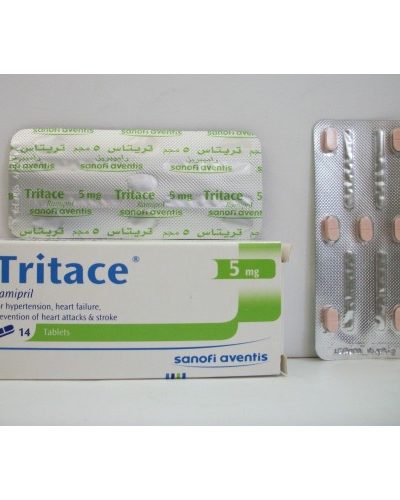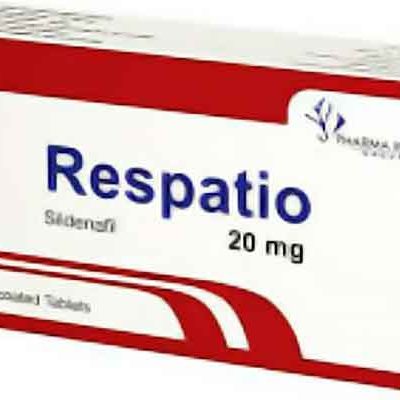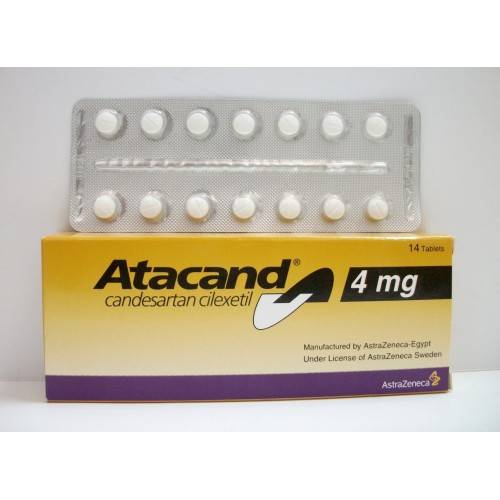- لا يوجد منتجات
-
RESPATIO 20 MG 20 TAB ريسباتيو
EGP63.00
Therapeutic Indications:
– Essential hypertension.
– Treatment of patients with heart failure & impaired left ventricle systolic function (left ventricular ejection as add-on therapy to ACE inhibitors or when ACE inhibitors are not tolerated .
* Posology & Method of Administration:
# Dosage in Hypertension:
– The recommended initial & usual maintenance dose of Atacand is 8 mg once daily. In patients who require further
blood pressure reduction, a dose increase to 16 mg once daily is recommended. The maximal antihypertensive effect
is attained within 4 weeks of initiation of treatment.
In patients with less than optimal blood pressure reduction of Atacand, combination with a thiazide diuretic is recommended.
– Use in elderly: No initial dosage adjustment is necessary in eldely patients.
– Use in impaired renal function:
No initial dosage adjustment is necessary in patients with mild to moderate renal impairment (i.e. creatinine clearance >/=
30 mL/min/1.73 m2 BSA). In patients with severe renal impairment (i.e. creatinine clearance <30 mL/min/1.73 m2 BSA,
the clinical experience is limited and a lower initial dose of 4 mg should be considered.
– Use in impaired hepatic function:
No initial dosage adjustment is necessary in patients with mild to moderate chronic liver disease. There is only limited
experience available in patients with severe hepatic impairment and/or cholestasis. A lower initial dose of 4 mg should
therefore be considered in these patients.
– Concomitant therapy: Addition of a thiazide-type diuretic such as hydrochlorothiazide has been shown to have an additive
antihypertensive effect with Atacand. (Atacand may be administered with other antihypertensive agents).
# Dosage in Heart Failure:
– The usual recommended initial dose of Atacand is 4 mg once daily. Up-titration to the target dose of 32 mg once daily or
the highest tolerated dose is done by doubling the dose at intervals of at least 2 weeks.
– Special patient populations: No initial dose adjustment is necessary for eldely patients or in patients with renal or hepatic
impairment.
– Concomitant therapy: Atacand can be administered with other heart failure treatment, including ACE inhibitors, beta-blockers,
diuretics & digitalis or a combination of these medicinal products.
# Administration: Atacand should be taken once daily with or without food.
# Use in children & adolescents: The safety & efficacy of Atacand have not been established in children & adolescents
under 18 years.
* Contraindications:
– Hypersensitivity to any component of Atacand.
– Pregnancy and lactation.
* Special warnings and precautions for use:
# Renal impairment:
– As with other agents inhibiting the renin-angiotensin-aldosterone system, changes in renal function may be anticipated
in susceptible patients treated with Atacand.
– When Atacand is used in hypertensive patients with renal impairment, periodic monitoring of serum potassium and
creatinine levels is recommended. There is limited experience in patients with very severe or end-stage renal impairment
(i.e. creatinine clearance<15 ml/min).
– Evaluation of patients with heart failure should include periodic assessments of renal function, especially in elderly patients
75 years or older, and patients with impaired renal function. During dose titration of Atacand, monitoring of serum creatinine
and potassium is recommended. Clinical trials in heart failure did not include patients with serum creatinine >265 ?mol/L (>3 mg/dL).
# Concomitant therapy with an ACE inhibitor in heart failure:
The risk of adverse events, especially renal function impairment and hyperkalaemia, may increase when candesartan is
used in combination with an ACE inhibitor (see section 4.8 Undesirable effects). Patients with such treatment should be
monitored regularly and carefully.
# Renal artery stenosis:
Other drugs that affect the renin-angiotensin-aldosterone system, i.e. angiotensin converting enzyme (ACE) inhibitors,
may increase blood urea and serum creatinine in patients with bilateral renal artery stenosis or stenosis of the artery
to a solitary kidney. A similar effect may be anticipated with angiotensin II receptor antagonists.
# Kidney transplantation:
There is no experience regarding the administration of Atacand therapy in patients with a recent kidney transplantation.
# Hypotension:
Hypotension may occur during treatment with Atacand in heart failure patients. As described for other agents acting on
the renin-angiotensin-aldosterone system, it may also occur in hypertensive patients with intravascular volume depletion
such as those receiving high dose diuretics. Caution should be observed when initiating therapy and correction
of hypovolemia should be attempted.
# Anaesthesia and surgery:
Hypotension may occur during anaesthesia and surgery in patients treated with angiotensin II antagonists due to blockade
of the renin-angiotensin system. Very rarely, hypotension may be severe such that it may warrant the use of intravenous
fluids and/or vasopressors.
# Aortic and mitral valve stenosis (obstructive hypertrophic cardiomyopathy):
As with other vasodilators, special caution is indicated in patients suffering from haemodynamically relevant aortic or mitral
valve stenosis, or obstructive hypertrophic cardiomyopathy.
# Primary hyperaldosteronism:
Patients with primary hyperaldosteronism will not generally respond to antihypertensive drugs acting through inhibition
of the renin-angitensin-aldosterone system. Therefore, the use of Atacand is not recommended.
# Hyperkalaemia:
– Based on experience with the use of other medicinal products that affect the renin-angiotensin-aldosterone system,
concomitant use of Atacand with potassium-sparing diuretics, potassium supplements, salt substitutes containing potassium,
or other drugs that may increase potassium levels (e.g. heparin) may lead to increases in serum potassium in hypertensive patients.
– In heart failure patients treated with Atacand, hyperkalaemia may occur. During treatment with Atacand in patients with heart
failure, periodic monitoring of serum potassium is recommended, especially when taken concomitantly with ACE inhibitors and
potassium-sparing diuretics such as spironolactone.
# General:
In patients whose vascular tone and renal function depend predominantly on the activity of the renin-angiotensin-aldosterone
system (e.g. patients with severe congestive heart failure or underlying renal disease, including renal artery stenosis), treatment
with other medicinal products that affect this system has been associated with acute hypotension, azotaemia, oliguria or, rarely,
acute renal failure. The possibility of similar effects cannot be excluded with angiotensin II receptor antagonists. As with any
antihypertensive agent, excessive blood pressure decrease in patients with ischaemic cardiopathy or ischaemic cerebrovascular
disease could result in a myocardial infarction or stroke.









المراجعات
لا توجد مراجعات بعد.